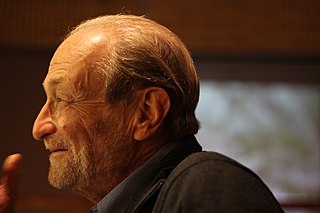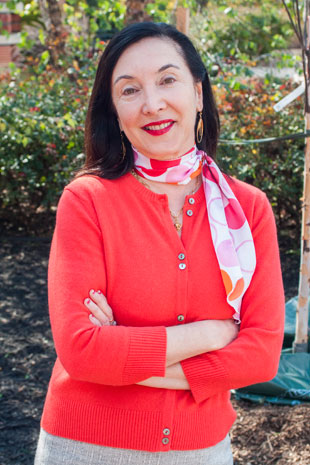Related Research Articles
Language acquisition is the process by which humans acquire the capacity to perceive and comprehend language, as well as to produce and use words and sentences to communicate.

Jacques Mehler was a cognitive psychologist specializing in language acquisition.
Bootstrapping is a term used in language acquisition in the field of linguistics. It refers to the idea that humans are born innately equipped with a mental faculty that forms the basis of language. It is this language faculty that allows children to effortlessly acquire language. As a process, bootstrapping can be divided into different domains, according to whether it involves semantic bootstrapping, syntactic bootstrapping, prosodic bootstrapping, or pragmatic bootstrapping.
Developmental linguistics is the study of the development of linguistic ability in an individual, particularly the acquisition of language in childhood. It involves research into the different stages in language acquisition, language retention, and language loss in both first and second languages, in addition to the area of bilingualism. Before infants can speak, the neural circuits in their brains are constantly being influenced by exposure to language. Developmental linguistics supports the idea that linguistic analysis is not timeless, as claimed in other approaches, but time-sensitive, and is not autonomous – social-communicative as well as bio-neurological aspects have to be taken into account in determining the causes of linguistic developments.
Phonological development refers to how children learn to organize sounds into meaning or language (phonology) during their stages of growth.

Laura-Ann Petitto is a cognitive neuroscientist and a developmental cognitive neuroscientist known for her research and scientific discoveries involving the language capacity of chimpanzees, the biological bases of language in humans, especially early language acquisition, early reading, and bilingualism, bilingual reading, and the bilingual brain. Significant scientific discoveries include the existence of linguistic babbling on the hands of deaf babies and the equivalent neural processing of signed and spoken languages in the human brain. She is recognized for her contributions to the creation of the new scientific discipline, called educational neuroscience. Petitto chaired a new undergraduate department at Dartmouth College, called "Educational Neuroscience and Human Development" (2002-2007), and was a Co-Principal Investigator in the National Science Foundation and Dartmouth's Science of Learning Center, called the "Center for Cognitive and Educational Neuroscience" (2004-2007). At Gallaudet University (2011–present), Petitto led a team in the creation of the first PhD in Educational Neuroscience program in the United States. Petitto is the Co-Principal Investigator as well as Science Director of the National Science Foundation and Gallaudet University’s Science of Learning Center, called the "Visual Language and Visual Learning Center (VL2)". Petitto is also founder and Scientific Director of the Brain and Language Laboratory for Neuroimaging (“BL2”) at Gallaudet University.
Patricia Katherine Kuhl is a Professor of Speech and Hearing Sciences and co-director of the Institute for Learning & Brain Sciences at the University of Washington. She specializes in language acquisition and the neural bases of language, and she has also conducted research on language development in autism and computer speech recognition. Kuhl currently serves as an associate editor for the journals Journal of the Acoustical Society of America, Neuroscience, and Developmental Science.

Angela Friederici is a director at the Max Planck Institute for Human Cognitive and Brain Sciences in Leipzig, Germany, and is an internationally recognized expert in neuropsychology and linguistics. She is the author of over 400 academic articles and book chapters, and has edited 15 books on linguistics, neuroscience, language and psychology.
Statistical language acquisition, a branch of developmental psycholinguistics, studies the process by which humans develop the ability to perceive, produce, comprehend, and communicate with natural language in all of its aspects through the use of general learning mechanisms operating on statistical patterns in the linguistic input. Statistical learning acquisition claims that infants' language-learning is based on pattern perception rather than an innate biological grammar. Several statistical elements such as frequency of words, frequent frames, phonotactic patterns and other regularities provide information on language structure and meaning for facilitation of language acquisition.
Usha Claire Goswami is a researcher and professor of Cognitive Developmental Neuroscience at the University of Cambridge, a Fellow of St. John's College, Cambridge, and the director of the Centre for Neuroscience in Education, Downing Site. She obtained her Ph.D. in developmental psychology from the University of Oxford before becoming a professor of cognitive developmental psychology at the University College London. Goswami's work is primarily in educational neuroscience with major focuses on reading development and developmental dyslexia.

Janet F. Werker is a researcher in the field of developmental psychology. She researches the foundations of monolingual and bilingual infant language acquisition in infants at the University of British Columbia's Infant Studies Centre. Her research has pioneered what are now accepted baselines in the field, showing that language learning begins in early infancy and is shaped by experience across the first year of life.
Prosodic bootstrapping in linguistics refers to the hypothesis that learners of a primary language (L1) use prosodic features such as pitch, tempo, rhythm, amplitude, and other auditory aspects from the speech signal as a cue to identify other properties of grammar, such as syntactic structure. Acoustically signaled prosodic units in the stream of speech may provide critical perceptual cues by which infants initially discover syntactic phrases in their language. Although these features by themselves are not enough to help infants learn the entire syntax of their native language, they provide various cues about different grammatical properties of the language, such as identifying the ordering of heads and complements in the language using stress prominence, indicating the location of phrase boundaries, and word boundaries. It is argued that prosody of a language plays an initial role in the acquisition of the first language helping children to uncover the syntax of the language, mainly due to the fact that children are sensitive to prosodic cues at a very young age.
Núria Sebastián Gallés is a cognitive scientist known for her work on bilingual language development and the impact of bilingualism on cognition. She is Professor of Psychology at Pompeu Fabra University where she heads the Speech Acquisition and Perception (SAP) Research Group. In 2012, Sebastián Gallés received the Narcis Monturiol Medal as recognition of her scientific contributions. She was elected Fellow of the British Academy in 2016.
Iris Berent is an Israeli-American cognitive psychologist. She is a Professor of Psychology at Northeastern University and the director of the Language and Mind Lab. She is among the founders of experimental phonology—a field that uses the methods of experimental psychology and neuroscience to study phonological competence. She has also explored the role of phonological competence in reading ability and dyslexia. Her recent work has examined how laypeople reason about innate knowledge, such as universal grammar.
Marina Nespor is a Professor of linguistics at the Scuola Internazionale Superiore di Studi Avanzati in Trieste, Italy, and senior researcher in the ERC PASCAL Project, a project investigating language acquisition and the nature of the biological endowment that allows humans to learn language. Much of Dr. Nespor's research focuses on the interaction of phonology and syntax: what the prosodic structure of an utterance communicates about its grammatical structure.
Lorraine Komisarjevsky Tyler, is a British neuroscientist. She is Professor of Cognitive Neuroscience at the University of Cambridge.
Marilyn Shatz is an American scholar known for her work in language development and discourse. She holds the title of Professor Emerita of Psychology and Linguistics at the University of Michigan, where she worked from 1977 until retiring in 2009.
Alejandrina Cristia is an Argentinian linguist known for research on infant-directed speech, daylong audio recordings of children's diverse linguistic environments, and language acquisition across cultures. Cristia is interested in how phonetic and phonological representations are formed during infancy and their interactions with other linguistic formats and cognitive mechanisms. She holds the position of Research Director of the Laboratoire de Sciences Cognitives et Psycholinguistique (LSCP) at the Paris Sciences et Lettres University.

Ghislaine Dehaene-Lambertz is a French paediatrician, Professor and Director of the Developmental Neuroimaging Lab at CNRS. Her research uses non-invasive brain imaging to understand children's cognitive function. She was elected to the National Academy of Sciences in 2022.
Elika Bergelson is a language scientist known for her work on language acquisition and cognitive development. She was the principal investigator of the SEEDLingS project, a longitudinal study of word learning in infants from 6 to 18 months. Bergelson was selected for Forbes' 30 under 30 in 2015 for her work on language acquisition.
References
- 1 2 3 4 "Judit Gervain". Academia Europaea. Retrieved 27 January 2024.
- 1 2 "JUDIT GERVAIN". Università degli Studi di Padova. Retrieved 27 January 2024.
- ↑ "Judit Gervain – Curriculum Vitae". Academia Europaea. Retrieved 27 January 2024.
- 1 2 "Tuned to the Rhythm". CORDIS. Retrieved 27 January 2024.
- ↑ "Judit Gervain". Brainvitge. Retrieved 3 February 2024.